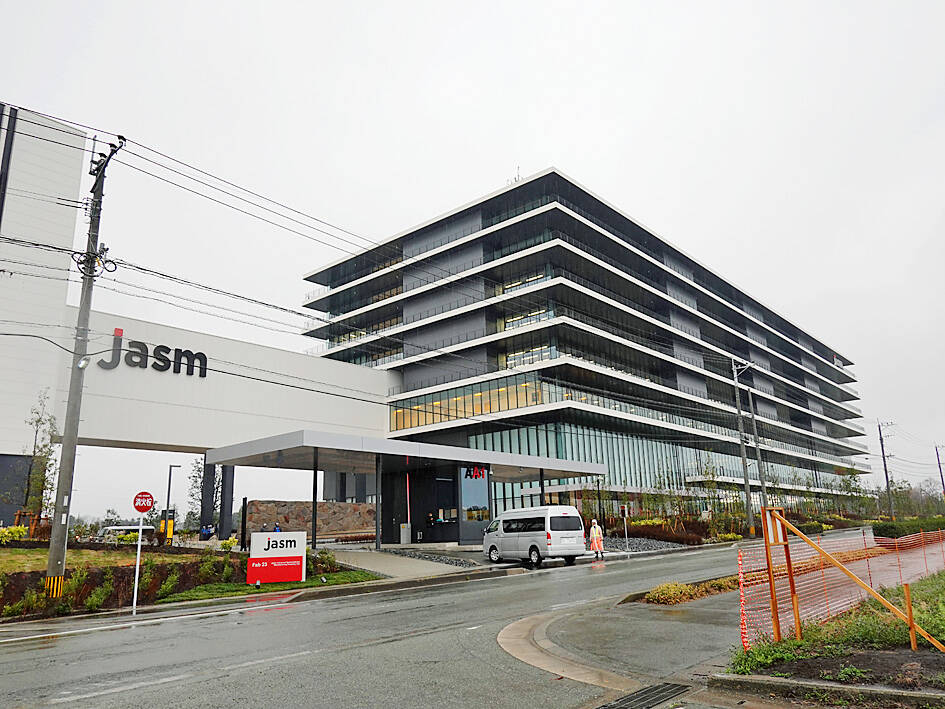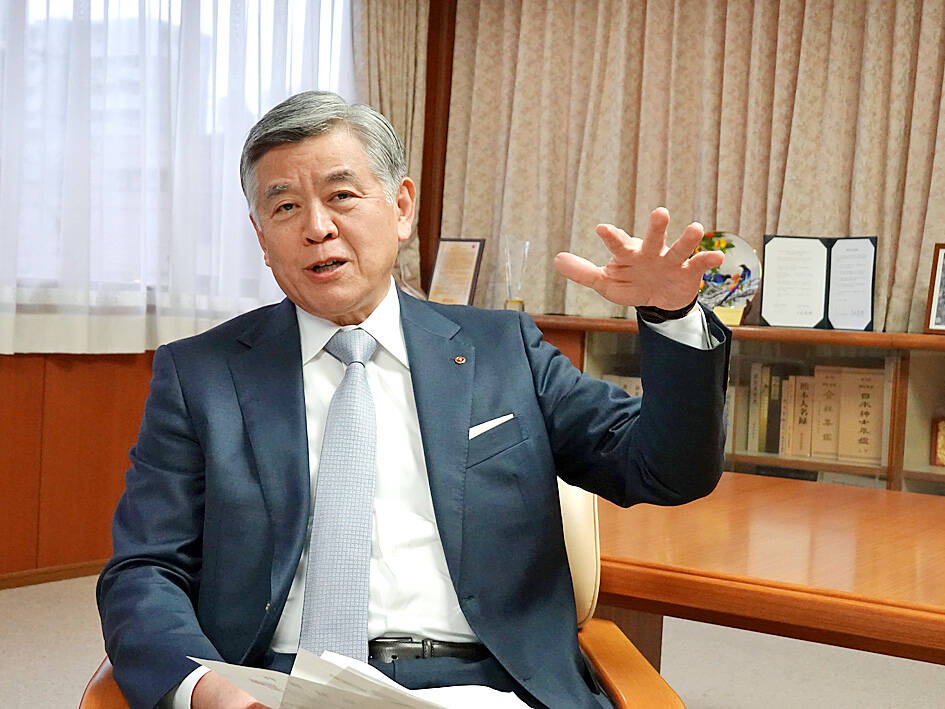The arrival of Taiwan Semiconductor Manufacturing Co (TSMC, 台積電) in Japan’s Kumamoto Prefecture marks the regaining of the area’s pivotal position established during the Meiji Restoration in the 19th century, a local business leader said in an interview with CNA.
The first fab of Japan Advanced Semiconductor Manufacturing Inc (JASM), TSMC’s majority-owned manufacturing subsidiary in Kumamoto, is set to open today.
After the 1868 Meiji Restoration, Kumamoto was of key importance as it was home to a major garrison national defense. However, that position was ceded to Fukuoka after World War II as Japan turned to foreign trade for post-war economic development, and Kumamoto does not have a port, Kumamoto Chamber of Commerce and Industry chairman Akito Kuga said on Thursday.

Photo: CNA
JASM was set up by TSMC and Sony Group Corp in Kumamoto — and with it came a range of industries. As a result, the prefecture has gained renewed attention, Kuga said.
Kyushu, where Kumamoto Prefecture is situated, once had a successful semiconductor industry that led to it being called “silicon island Kyushu,” but it later fell into decline, he said.
With TSMC’s arrival, some have suggested that “silicon island Kyushu” is rising again, but Kuga said a “reborn silicon island Kyushu” would be a more apt description.

Photo: CNA
Japanese conglomerations such as Sony, Mitsubishi Electric Corp, Sumco Corp and Kyocera Corp have all made major semiconductor-related investments in Kyushu following TSMC’s announcement in 2021 that it planned to set up a plant in Kumamoto.
Fujifilm Holdings Corp last month expanded manufacturing facilities in its semiconductor materials factory in Kumamoto’s Kikuyo town, where TSMC’s plant is located, while Ebara Corp, a major industry machinery producer, in June last year announced plans to set up new factories to produce semiconductor-making equipment in Kumamoto.
Rohm Semiconductor, a Japanese company, is investing 289.2 billion yen in a new semiconductor plant in Miyazaki Prefecture, also in Kyushu, to produce silicon carbide power chips popular with electric car makers.
When asked about the estimated economic benefits to be generated by the TSMC Kumamoto plant, Kuga said if two Kumamoto fabs are built, bringing in 3.2 trillion yen of investment, there could be a total of 10.5 trillion yen over 10 years until 2030, citing an estimation done by the Kyushu Economic Research Center in December last year.
However, that number does not include investments made on residences and other infrastructure, he said, estimating that the figure could reach tens of trillions of yen if these are included.
Taiwan is not the only country that is seeing its semiconductor-related companies invest in Japan, as some major US semiconductor companies are also building new plants in Japan, Kuga said.
However, the Japanese business head said that since TSMC’s business model is one of co-manufacturing and co-researching new techniques with different kinds of corporations, it has the best prospect among those investing in Japan.
Kuga also mentioned misgivings about TSMC’s arrival in Kumamoto, a prefecture that is the fifth biggest producer of agricultural products in the country.
The influx of factories will make striking a balance between the needs of farmland for livestock farming and industrial development an ongoing task for the local government, he said.
At the end of the interview, Kuga told CNA that he welcomes Taiwanese people working in Kumamoto, as he believes there are many similarities between Taiwanese and Kumamoto people, such as proactivity, work capabilities, and most importantly, their cheerfulness.
“Pay has also been pushed up [by the semiconductor boom],” he said.

The US dollar was trading at NT$29.7 at 10am today on the Taipei Foreign Exchange, as the New Taiwan dollar gained NT$1.364 from the previous close last week. The NT dollar continued to rise today, after surging 3.07 percent on Friday. After opening at NT$30.91, the NT dollar gained more than NT$1 in just 15 minutes, briefly passing the NT$30 mark. Before the US Department of the Treasury's semi-annual currency report came out, expectations that the NT dollar would keep rising were already building. The NT dollar on Friday closed at NT$31.064, up by NT$0.953 — a 3.07 percent single-day gain. Today,

‘SHORT TERM’: The local currency would likely remain strong in the near term, driven by anticipated US trade pressure, capital inflows and expectations of a US Fed rate cut The US dollar is expected to fall below NT$30 in the near term, as traders anticipate increased pressure from Washington for Taiwan to allow the New Taiwan dollar to appreciate, Cathay United Bank (國泰世華銀行) chief economist Lin Chi-chao (林啟超) said. Following a sharp drop in the greenback against the NT dollar on Friday, Lin told the Central News Agency that the local currency is likely to remain strong in the short term, driven in part by market psychology surrounding anticipated US policy pressure. On Friday, the US dollar fell NT$0.953, or 3.07 percent, closing at NT$31.064 — its lowest level since Jan.

The New Taiwan dollar and Taiwanese stocks surged on signs that trade tensions between the world’s top two economies might start easing and as US tech earnings boosted the outlook of the nation’s semiconductor exports. The NT dollar strengthened as much as 3.8 percent versus the US dollar to 30.815, the biggest intraday gain since January 2011, closing at NT$31.064. The benchmark TAIEX jumped 2.73 percent to outperform the region’s equity gauges. Outlook for global trade improved after China said it is assessing possible trade talks with the US, providing a boost for the nation’s currency and shares. As the NT dollar

The Financial Supervisory Commission (FSC) yesterday met with some of the nation’s largest insurance companies as a skyrocketing New Taiwan dollar piles pressure on their hundreds of billions of dollars in US bond investments. The commission has asked some life insurance firms, among the biggest Asian holders of US debt, to discuss how the rapidly strengthening NT dollar has impacted their operations, people familiar with the matter said. The meeting took place as the NT dollar jumped as much as 5 percent yesterday, its biggest intraday gain in more than three decades. The local currency surged as exporters rushed to